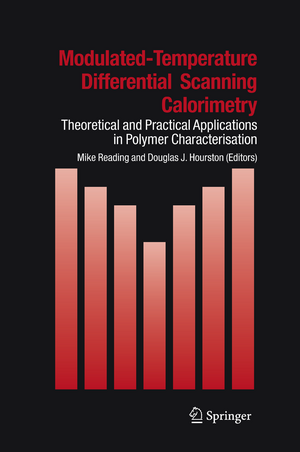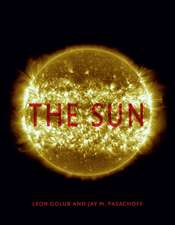Modulated Temperature Differential Scanning Calorimetry: Theoretical and Practical Applications in Polymer Characterisation: Hot Topics in Thermal Analysis and Calorimetry, cartea 6
Editat de Mike Reading, Douglas J. Hourstonen Limba Engleză Hardback – 22 feb 2006
In 1992 a new calorimetric technique was introduced that superimposed a small modulation on top of the conventional linear temperature program typically used in differential scanning calorimetry. This was combined with a method of data analysis that enabled the sample’s response to the linear component of the temperature program to be separated from its response to the periodic component. In this way, for the first time, a signal equivalent to that of conventional DSC was obtained simultaneously with a measure of the sample’s heat capacity from the modulation. The new information this provided sparked a revolution in scanning calorimetry by enabling new insights to be gained into almost all aspects of polymer characteristics.
This book provides both a basic and advanced treatment of the theory of the technique followed by a detailed exposition of its application to reacting systems, blends and semicrystalline polymers by the leaders in all of these fields. It is an essential text for anybody interested in calorimetry or polymer characterization, especially if they have found that conventional DSC cannot help them with their problems.
| Toate formatele și edițiile | Preț | Express |
|---|---|---|
| Paperback (1) | 1382.37 lei 43-57 zile | |
| SPRINGER NETHERLANDS – 18 noi 2010 | 1382.37 lei 43-57 zile | |
| Hardback (1) | 1388.53 lei 43-57 zile | |
| SPRINGER NETHERLANDS – 22 feb 2006 | 1388.53 lei 43-57 zile |
Preț: 1388.53 lei
Preț vechi: 1693.34 lei
-18% Nou
Puncte Express: 2083
Preț estimativ în valută:
265.70€ • 278.11$ • 221.14£
265.70€ • 278.11$ • 221.14£
Carte tipărită la comandă
Livrare economică 31 martie-14 aprilie
Preluare comenzi: 021 569.72.76
Specificații
ISBN-13: 9781402037498
ISBN-10: 140203749X
Pagini: 338
Ilustrații: XIV, 330 p.
Dimensiuni: 155 x 235 x 21 mm
Greutate: 0.66 kg
Ediția:2006
Editura: SPRINGER NETHERLANDS
Colecția Springer
Seria Hot Topics in Thermal Analysis and Calorimetry
Locul publicării:Dordrecht, Netherlands
ISBN-10: 140203749X
Pagini: 338
Ilustrații: XIV, 330 p.
Dimensiuni: 155 x 235 x 21 mm
Greutate: 0.66 kg
Ediția:2006
Editura: SPRINGER NETHERLANDS
Colecția Springer
Seria Hot Topics in Thermal Analysis and Calorimetry
Locul publicării:Dordrecht, Netherlands
Public țintă
ResearchCuprins
Theory and Practice of Modulated Temperature Differential Scanning Calorimetry.- The Application of Modulated Temperature Differential Scanning Calorimetry for the Characterisation of Curing Systems.- Applications of Modulated Temperature Differential Scanning Calorimetry to Polymer Blends and Related Systems.- The Application of MTDSC to Polymer Melting.
Notă biografică
Michael Reading is a Professor of Pharmaceutical Characterisation Science at the University of East Anglia, Norwich, UK.
After post doctoral work in France (CNRS centre for calorimetry and thermodynamics, Marseilles), Mike Reading worked with ICI until 1997, when he left to join the IPTME in Loughborough University. In 2004 he moved to UEA to take up a chair in pharmaceutical characterisation science.
Research Posts: As a senior research scientist with ICI paints, Mike Reading was involved in a wide range of materials science and analysis projects (mainly involving polymers). One outcome from his work was Modulated Temperature Differential Scanning Calorimetry which has now become a common, commercially available technique. With co-workers Azzedine Hammiche and Hubert Pollock of Lancaster University, he invented a scanning probe microscopy based technique known as of micro thermal analysis. This has become a commercially available instrument and has won a number of awards for innovation.
Douglas J. Hourston is a Professor of Polymer Technology at Loughborough University, UK, with a long career in polymer colloids research and expertise in emulsion polymerization, structured latex particles, water-dispersible polyurethanes, and film integration.
After post doctoral work in France (CNRS centre for calorimetry and thermodynamics, Marseilles), Mike Reading worked with ICI until 1997, when he left to join the IPTME in Loughborough University. In 2004 he moved to UEA to take up a chair in pharmaceutical characterisation science.
Research Posts: As a senior research scientist with ICI paints, Mike Reading was involved in a wide range of materials science and analysis projects (mainly involving polymers). One outcome from his work was Modulated Temperature Differential Scanning Calorimetry which has now become a common, commercially available technique. With co-workers Azzedine Hammiche and Hubert Pollock of Lancaster University, he invented a scanning probe microscopy based technique known as of micro thermal analysis. This has become a commercially available instrument and has won a number of awards for innovation.
Douglas J. Hourston is a Professor of Polymer Technology at Loughborough University, UK, with a long career in polymer colloids research and expertise in emulsion polymerization, structured latex particles, water-dispersible polyurethanes, and film integration.
Caracteristici
First book on this topic Written by the inventor and principal exponents of the technique Modulated Temperature DSC can do things that conventional DSC is unable to do Combines a full discussion of the theory with important illustrations of the applicability of the technique

















